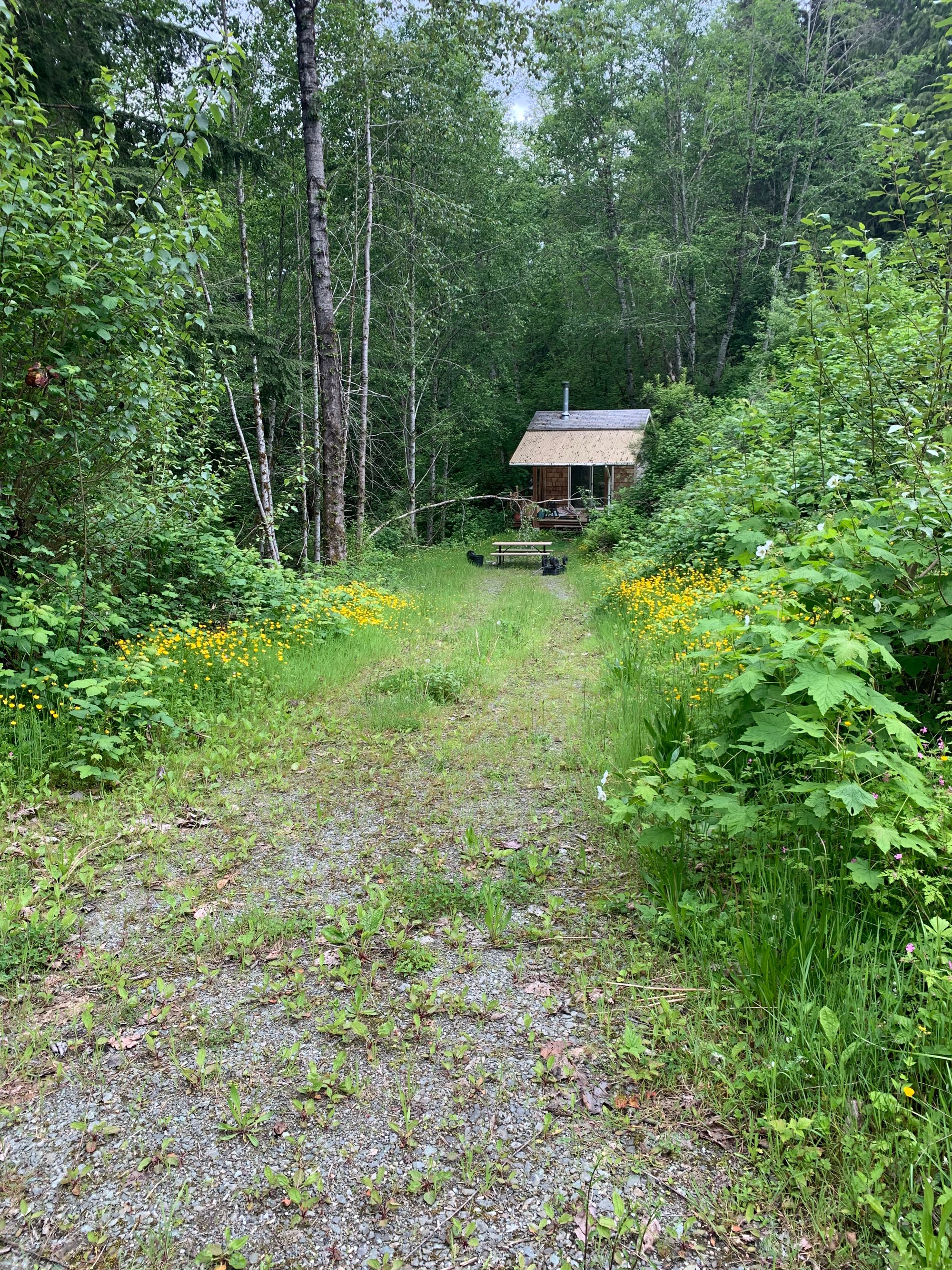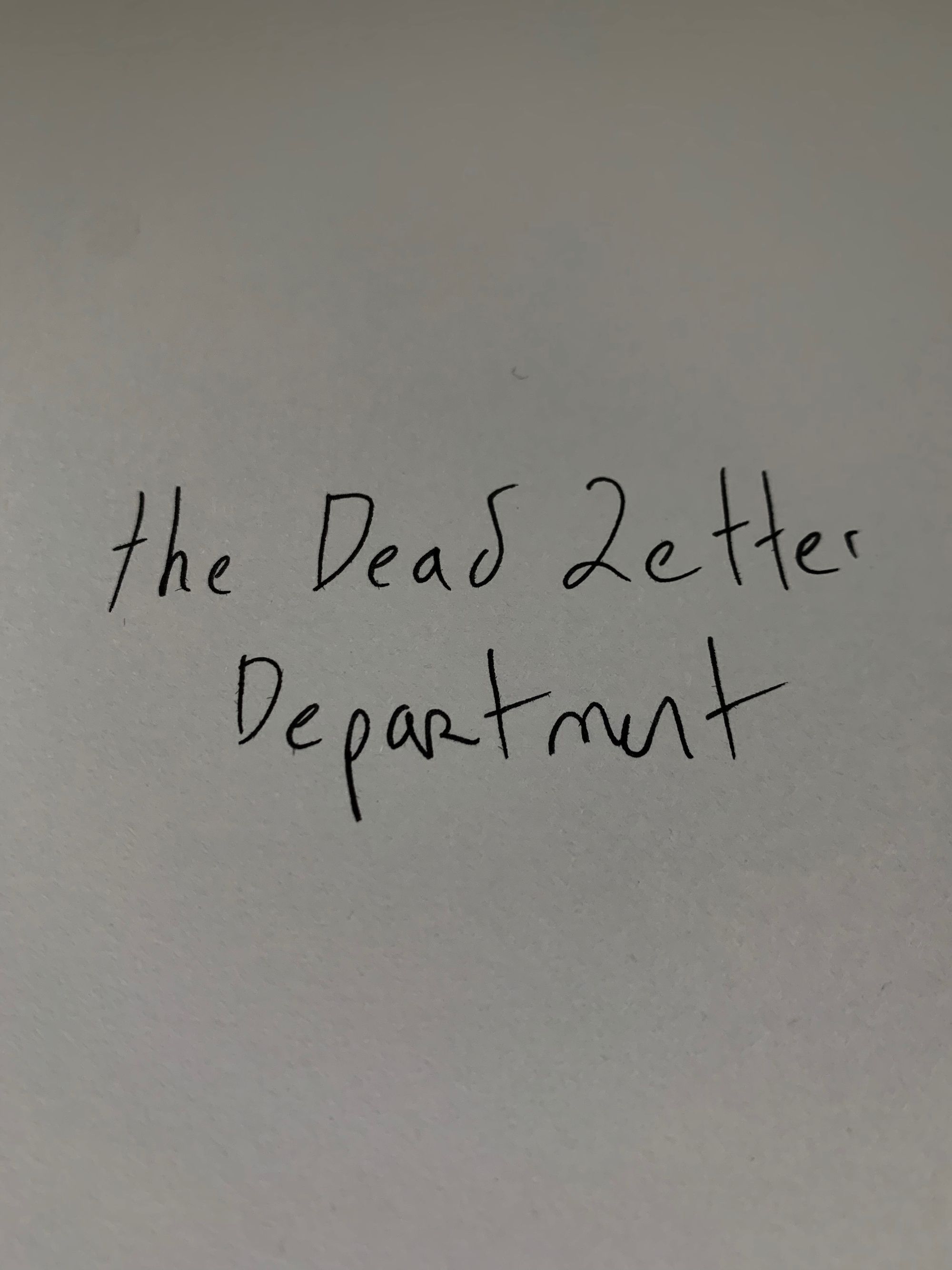Dead Letter Department #32
(did you miss Dead Letter Department #31? read about visiting Portland & talking to strangers here.)
weather report

I’m writing this to you from a little cabin where I’ve been coming to work occasionally—a friend owns it, & doesn’t mind if I bring my laptop down to wander around the woods muttering to myself about projects. There is, blessedly, no internet, which means I can’t snag myself on a doomscroll after ‘just checking my email.’ Last time my only visitors were a tiny green & red tree frog & a pair of little yellow finches who were clearly courting their way through the hedges. This time, a black & white butterfly so huge I could hear the wings & the first of this year’s glassy-winged dragonflies. It’s quiet, just the steady sound of the creek in the gully & a very occasional car passing on the road below.
The big writing project has been—stuck. In my craw, in my throat, in some other uncomfortable writing-related organ. Not to the point of not making any progress at all, but the work I am doing comes in inches instead of feet. I can’t remember the last time I felt that beautiful, self-erasing flow where I get thousands of words in a week & the whole world of the book is pulling together one piece at a time out of thin air & the tips of my fingers. I miss it.
I keep arriving at the point of setting the project aside, moving on to one of the half dozen much smaller, less built-out drafts that are also calling for my attention. But here’s the problem with that—I don’t want to. I want this book to live. I think about the characters all the time—which can actually be part of the problem, because when the thinking turns unproductive for long enough it just becomes a sort of endless guilty litany of how I’m never going to finish & I’ve wasted all this time & everyone I know has been hovering & waiting for the right psychological moment to gently bring up my abject failure with this project & also generally.
This is probably not accurate. Right? I’m going to pretend you agreed with me there.
Anyway, it seems a little less true every time the manuscript & I manage to leap some sort of narrative hurdle together. Even just two hours of clear, real writing time is better than six interspersed with social media sinkholes—better productivity, better word count, but also it gives a hint of that old addictive feeling of actually building towards something, pushing that familiar bridge out one plank at a time instead of frantically papering over an ever-deeper & more existential hole.
All of which is to say I drove nearly an hour this morning to sit at an even quieter desk, near even more trees, & it was a great decision. The rain keeps rolling in & out—I hear it coming, pattering over the blackberry bushes, but I wait until it’s actually hitting the picnic table before rushing back to the little porch, because there my desk is just an overturned wicker stool.
The drive here is almost the exact length of Dance Fever, Florence + the Machine’s new album which is perfect because that’s all I’ve wanted to listen to. I’m late sending out the next edition of the mix CD mailing largely because it’s meant to be a sampling of what I’m listening to & all I’d want to do right now is park you in my front seat with the volume up a little too high while I express my many urgent opinions about ‘King’ and ‘Girls Against God.’ The sign up sheet for this auditory experience is obviously wide open at the moment, so let me know if you’re into it.

reading room
It took me a long time to read, partially because I was making so many notes, partially because it’s a brutal retelling of the post treaty years, but Tulalip From My Heart by Harriette Shelton Dover is well worth the hours, especially if you live in the Pacific Northwest. It’s fascinatingly written, told by Hariette Dover, a Snohomish elder from the Tulalip reservation, in a series of tape recorded sessions to Darleen Fitzpatrick, who then edited the text. The writer & editor met when Dover lectured at & then attended Fitzpatrick’s courses on Northwest Coast Native Cultures at Everett Community College—an experience Fitzpatrick compared to having Einstein come sit in on your Physics 101 course.
Dover’s memories of the residential boarding schools children were forced to attend are eviscerating, & will stay with me, but the thing I’ve been thinking about the most besides that is the way she writes about time. Time is a problem for me, mostly in that I cannot get it to do what I want, & I am so used to reading nonfiction in particular that treats it as law—but Dover says this:
“But when that party of white people said I couldn’t compare a legend to the Bible, I said I could compare it, I do compare it, and I said the Bible isn’t any more inspired than this is. These legends are old, old. They come from what my parents said, my father used to say, was a time in our history of hundreds of years ago, a time that is like a curtain of fog or a mist that covers our past. It is just like in the morning if you look over toward the mountains or over the water, there is a mist that drifts.”
Imagine that—a mist of time, hanging over the land.
Apparently it was a bit of a struggle to get the book published because the editors wanted a straight forward narrative experience—point A to B to C—the years pass & we read them in order, & Dover refused. Her stories loop & repeat, circling back until you almost feel like you’re listening to them instead of reading.
one good thing
My social media has been overrun with Our Flag Means Death content to the point where I feel like everyone must have watched it nine times already, but in case you haven’t, here’s the pitch. Remember all the shows you’ve watched where it seemed like something queer might be happening, maybe this time it really would, & then it didn’t? It just skated right up to the edge & then took a sharp left into another unconvincing love story (thank you, Captain America) or nuclear family propaganda (pretty much everything else) And then we were all heartbroken & went off to talk about queer subtext as a tiny, shitty consolation prize, or maybe, for the industrious among us, to write corrective & moving fanfiction? Our Flag Means Death is the opposite.
It’s about pirates, but it doesn’t care terribly much about the actual piracy. It does care about a band of ridiculous idiots all sailing around together, & it does care about a deeply convincing late in life love story, which might be the only kind I really want at the moment, & maybe most of all it cares about queer masculinity, in such an array of gentleness and absurdity & variety that it boggles the mind. Rhys Darby plays Stede Bonnet, a flower-picking dandy who leaves his life of luxury to become a profoundly ineffectual pirate. Taika Waititi plays Blackbeard (& no matter how much the genius who made that wig & beard (beard wig?? is that a thing?)) is making, they need more). When they meet, it gets very very good & if there isn’t a second season I will be rending my garments & making a public nuisance of myself in sheer outrage.
If you like the newsletter, please share it with a friend or write to me at departmentofdeadletters@gmail.com. I hope to see you here at the Dead Letter Department again soon, & in the meantime may your subtext be outsung by the power of your furiously romantic text.
